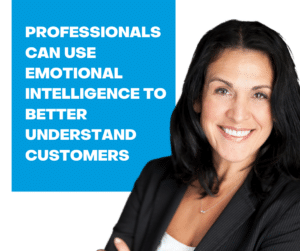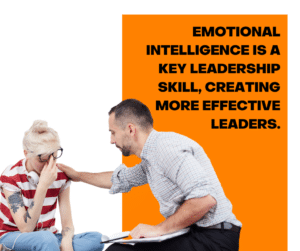How Business Emotional Intelligence Feeds Your Customer Experience
Emotional Intelligence and Customer Experience are Linked
Emotional intelligence allows us to take a more empathetic approach to business, accounting for both the logical and emotional response. It’s an important aspect of leadership and business especially when it comes to customer experience (CX). When defining your CX strategy, it’s important to understand the role that emotional intelligence holds because not only does it affect customers but also your employees as well.
Customer Experience Needs Emotional Intelligence
A CX strategy is designed to increase the quality of how customers interact with your business. For our purpose, we define customer experience as:
A lifetime commitment to our customers to provide value and support that gives them an effortless experience.
When interacting with a company, customers are looking for an easy, effortless experience that satisfies their known and unknown needs. As the key differentiator in business, it’s a must for every organization and the investment pays off; 86% will pay more for a great customer experience. For businesses to provide exceptional CX, they must not only have the technology to enable a great experience but also understand that their customers are also human and how they feel drives their purchasing habits.
 This is where emotional intelligence comes into play. Companies want to sell and there are few things more powerful than understanding the motivation behind the ideal customer profiles they target. Taking our example, a CEO may be frustrated by the fact that they cannot accurately predict their sales pipeline for revenue targeting, therefore they are looking for a new CRM. This frustration drives the purchase. It’s an essential value proposition to prospective customers—our product eliminates frustration and provides the predictive insight that you need as a leader. By solving the emotions behind the why companies can better serve the needs of their customers.
This is where emotional intelligence comes into play. Companies want to sell and there are few things more powerful than understanding the motivation behind the ideal customer profiles they target. Taking our example, a CEO may be frustrated by the fact that they cannot accurately predict their sales pipeline for revenue targeting, therefore they are looking for a new CRM. This frustration drives the purchase. It’s an essential value proposition to prospective customers—our product eliminates frustration and provides the predictive insight that you need as a leader. By solving the emotions behind the why companies can better serve the needs of their customers.
It’s a powerful combination. But it doesn’t apply to just selling; companies can additionally enhance their brand via emotional intelligence. By “reading the room,” brands can understand the current sentiment in the market and adapt as needed. This was never so important as the SARS-COV-2 pandemic: Brands who addressed the moment were celebrated, those who failed to do so were left behind. Through a combination of public feedback, commentary, and customer conversations, brands were able to find a response that worked for their brand to strengthen customer relationships and enhance their experience. Emotional intelligence allowed brands to pivot by providing empathy to their customers that faced unprecedented hardships and work to find a solution.
This is emotional intelligence at work, solving the needs of customers based on their viewpoint. Emotional intelligence provides added insight into customers, thereby increasing the overall experience. Without emotional intelligence, customer experience becomes a guessing game for brands on what works and what doesn’t. Customer perception is key in crafting a CX strategy and organizations cannot understand that perception without a form of emotional intelligence. CX that is effortless and also gauges the emotional involvement of customers will work for business because it creates not only an open dialog between customers and businesses but also a sense of mutual respect between the brand and customer.
Emotional Intelligence Beyond the Customer
It would be remiss to not talk about how emotional intelligence is not only important externally but also, internally with employees. Interactions with employees can also highly benefit from emotional intelligence because it creates a healthy environment in which employees feel empowered. Managers that utilize emotional intelligence are seen more favorably and able to communicate better with their team and in turn, employees are able to increase sales.
 The question becomes how to apply emotional intelligence when it comes to the workplace. It begins with leadership—leaders with emotional intelligence are more effective and emotional intelligence is a key leadership skill. For leaders, emotional intelligence allows them to understand and identify the common internal frustrations that employees have, making them feel heard and additionally understand the ways to motivate their team members to excel. These are direct ways that a leader can influence their employees but there’s a more indirect way as well that is also critical—leading by example. Creating an atmosphere of integrity and honesty, leaders must demonstrate these skills by following through with promises, working hand-in-hand with employees, and actively work to address inefficiencies.
The question becomes how to apply emotional intelligence when it comes to the workplace. It begins with leadership—leaders with emotional intelligence are more effective and emotional intelligence is a key leadership skill. For leaders, emotional intelligence allows them to understand and identify the common internal frustrations that employees have, making them feel heard and additionally understand the ways to motivate their team members to excel. These are direct ways that a leader can influence their employees but there’s a more indirect way as well that is also critical—leading by example. Creating an atmosphere of integrity and honesty, leaders must demonstrate these skills by following through with promises, working hand-in-hand with employees, and actively work to address inefficiencies.
The idea behind emotional intelligence internally is that it empowers employees. Employees that feel empowered are more engaged, thus increasing revenue. How businesses and leaders apply emotional intelligence internally is a good indication of your internal CX which matters for external CX. Companies that invest internally throughout their organization are more likely to be successful in their CX strategy. According to an interview with Françoise Mercadal-Delasalles in business thought leader McKinsey, “if you want your front-end employees to be very good at the relationship with their clients, then the core of the company, including the support functions, in particular, has to be very good with the front.” What Mercadal-Delasalles is highlighting here is that internal CX, how it’s highlighted in their own business to transfer to external customers. With customers over 40% more likely to leave a brand based on inefficiencies, internal investment is required to make sure that customers have an optional experience.
Internal investment leads to external rewards. While it is the described symmetry above, it’s not a utopia. Rather, this investment is part of an organization’s constant ability to be internally emotionally intelligent and invest to optimize where there are problems found. It’s a continual cycle of improvement and investment. As emotional intelligence and the response to CX changes, organizations must change alongside to stay relevant and remain in a position where they are responsive to employees and customers.
Bringing Together Emotional Intelligence and Customer Experience
Whatever your personal assessment of emotional intelligence, it’s not an instant skill—it takes work. But through emotional intelligence, businesses can feed their CX strategy and empower their internal employees to build better relationships and highlight problems to better increase internal CX. When used conjunctively, these two important aspects supercharge your ability to work with your customers and employees to increase understanding and achieve common goals. It’s an essential part of the cycle and part of the insight required to achieve true customer experience.



